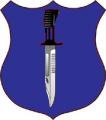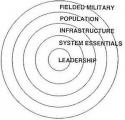A Modest Proposal to Adjust the Principles of War by LTC Gian Gentile at SWJ Blog.
I propose a consideration to adjust the Principles of War as accepted by the American military since J.F.C. Fuller first came out with them in the early 1920s and the American Army’s use of them in the majority of its major doctrinal manuals. I do not propose radically new principles of war like Lieutenant Commander Christopher Van Avery did in a recent summer Armed Forces Journal article. His proposal of very different Principles seemed too “new-ageish” for me and in my mind wrongly assumed that the information revolution of the 1990s produced a concomitant revolution in military affairs (a still debated and contested notion by scholars). Too, with regard to Avery, I do not accept his historical premise of now as the time to radically adjust the Principles of War because of the so called recent RMA; one could easily make the argument that we should have produced new Principles of War shortly after August 1945 and the advent of atomic war and Bernard Brodie’s classic The Absolute Weapon...












 And I put him right up there with Sherman (but not side-by-side).
And I put him right up there with Sherman (but not side-by-side).




Bookmarks